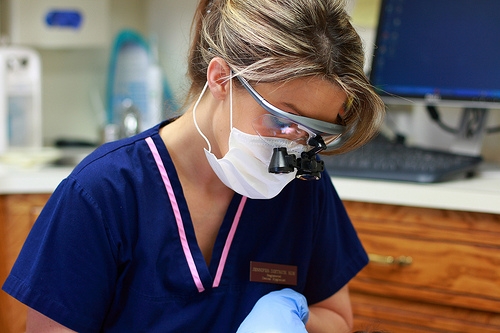Has the Pandemic Affected Children’s Oral Health?
February 23rd, 2022
The COVID-19 pandemic is approaching its two-year anniversary.
The pandemic, with its shutdowns, quarantines, and overall societal changes, has impacted every facet of our lives. As we reflect back on these last two years, we find some surprising unintentional health effects. Even as we’ve focused our efforts entirely on protecting the health of our communities, certain aspects of health for some of us have been negatively impacted by our efforts. Children’s oral health is one of those and identifying the reasons why will help us to repair the problems.
How Have Two Years of Pandemic Worsened Kids’ Pre-Existing Dental Health?
In March of 2020, when our country (along with the rest of the world) was figuring out how to navigate COVID-19, ‘elective’ procedures and surgeries were cancelled, sometimes for months at a time, in almost every state. This meant dental practices were either closed entirely, or available only for serious emergencies. Given that dental decay is one of, if not the, most common chronic illnesses of children in America, this created a crisis in children’s oral health. Untreated dental cavities lead to more serious infections, at least requiring more extensive dental treatment, but sometimes resulting in serious bodily infections.
Children who already had significant decay and planned restorative treatments when the shutdowns began, frequently ended up in hospital emergency departments to treat their increasing symptoms (pain, inability to eat or sleep, etc.), or more seriously, the spreading infections caused by untreated cavities. For these patients, what could have been in-office treatment often ended up requiring hospital-based general anesthesia for dental surgery, adding considerable expense and increased risk. Children with moderate dental problems at the onset of the pandemic faired only slightly better, often requiring more invasive in-office procedures to restore worsened dental health.
Even if your child went into March of 2020 with healthy teeth and mouth, the pandemic may have impacted his or her oral health, too. The months-long closure of most dental offices created a re-opening environment full of scheduling bottlenecks, due both to the backlog of delayed appointments and to the need for longer visits to accommodate patients’ additional treatment needs and new infection control protocols. This meant those 6-month preventive visits you never miss were very delayed or very hard to get scheduled.
When it Comes to Pandemic Effects, Think Outside-the-Mouth
The pre-pandemic state of our kids’ mouths isn’t the only factor affecting children’s oral health two years later. Things that have become our ‘new normal’ have had surprising impacts on pediatric dental health as well. For example, stay-at-home orders and online schooling allowed for more frequent snacking and drinking than would be typical in a child’s ‘normal’ day. It’s well understood that eating and drinking sugary or high carbohydrate items leads to tooth decay, but grazing and frequent snacking on even lower-sugar foods and drinks has also been shown to increase your risk of cavities. When we eat, the environment in our mouths becomes more acidic within seconds, but it takes much longer for our saliva to get our mouths back to a neutral pH. This means that frequent snacking or drinking beverages other than water can overwhelm your body’s ability to protect tooth enamel from the acidic environment, leading to increased tooth decay. Read more from our previous blog, Foods that Cause Decay.
Additionally, the toll of the pandemic and the sweeping changes it brought have had mental and emotional health effects on adults and children alike. For many children, especially those under 7 years old, expressing their pandemic-related anxiety and fear is difficult, and can often be illustrated unexpectedly. This can include what happens with the return to the Pediatric Dentist. Even children who never exhibited dental anxiety or fear before may be nervous about any medical facilities, (including dental offices), and extensive protective equipment worn by the providers. This can make dental visits more difficult for both patients and parents.
Bouncing Back from the Pandemic Toll on Oral Health
The good news is that our pediatric dental community has been able to overcome the challenges we’ve faced over the last two years and have learned so much more about how to bring our patients’ oral health back to the pre-pandemic baseline. Maintaining oral health and eating schedules at home, returning to routine preventive dental care, preparing kids for the emotional toll of returning to our offices, and treating any diagnosed dental issues as quickly as possible will position us all for success.
It’s been a long two years, but we’ve learned a lot about the importance of oral health for our communities, and our providers and patients are better for it!
All Smiles Pediatric Dentistry
At All Smiles Pediatric Dentistry we have taken steps to keep your children as safe as possible while in our office. Our initial protocol was set based on the guidance from the CDC, CalOSHA, and local government recommendations. As guidelines change, so will the practice to ensure you and your child have a safe appointment.
Get to Know Us
At All Smiles Pediatric Dentistry, we incorporate proven techniques to share with you and your child at each dental checkup visit. Dr. Allen Job and his team are committed to providing the latest in oral health care prevention. Check out our monthly blog posts! Our practice is centrally located in San Diego, CA.
Get acquainted with us by watching our practice video and find out what we do.
Scheduling an appointment for your child is easy! Start here to schedule an appointment. All of our forms are online. Fill them out securely from your smartphone or tablet and hit send. On appointment day, your child will be seen at their scheduled time. For example, if you have a 9:00 AM appointment, your child will be seen at 9:00 AM.
Dr. Allen Job, DDS, MS, MPH, MS is a board certified pediatric dentist who practices in San Diego, California, where he specializes in prevention. For more than a decade, served as assistant professor for the Department of Pediatric Dentistry at Loma Linda University School of Dentistry (LLUSD). He is currently an instructor at LLUSD.






